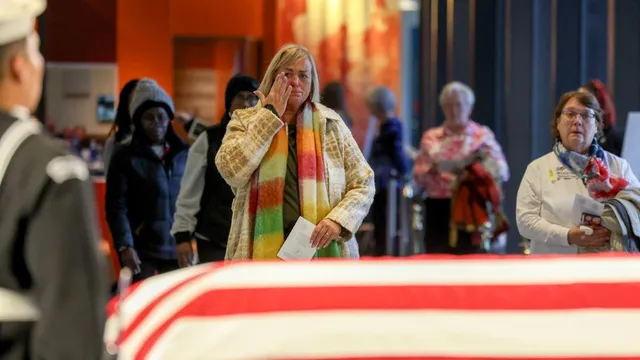
Kamala Harris to eulogize Jimmy Carter as he lies in state at Capitol
2025-01-09 11:00- Jimmy Carter died on December 29, 2024, at the age of 100, and his body lies in state at the U.S. Capitol.
- Public visitation allowed thousands to pay their respects during state funeral events over several days.
- Carter's contributions to humanitarian efforts and his unique life story continue to inspire many.
Express your sentiment!
Insights
In the United States, former president Jimmy Carter passed away on December 29, 2024, at the age of 100, marking the end of a life celebrated for its dedication to public service and humanitarian efforts. Following his death, arrangements were made for Carter's body to lie in state at the U.S. Capitol, allowing the public to pay their respects. This ceremony took place over a span of several days, culminating in a state funeral that was attended by dignitaries, including members of Congress and Supreme Court justices, underscoring Carter's lasting impact on American society. The proceedings began with a private memorial service at the Carter Presidential Center, where many gathered to honor a man whose legacy extends beyond his presidency. Notably remembered for his post-presidency contributions, including work with Habitat for Humanity and his commitment to peace initiatives, Carter's life encompassed considerable achievements following his tenure in office, which lasted from 1977 to 1981. His casket was transported from Atlanta to Washington, D.C., where a solemn ceremony was held, reflecting the respect and admiration he garnered throughout his life. During his public visitation at the Capitol, which lasted for nearly two days, thousands of people queued to pay their last respects to a leader who was applauded for his humility and focus on serving others. The outpouring of grief and support illustrated how deeply Carter was regarded, with over 23,000 individuals reportedly attending to honor him. Following the state funeral at the National Cathedral, his remains were set to return to Plains, Georgia, where a final private service and burial alongside his beloved wife, Rosalynn, would take place. Carter’s life story, from a peanut farmer to the president of the United States, serves as an inspiration to many, symbolizing what can be achieved with dedication and a commitment to humanitarianism. His passing not only marks the end of an era but also calls attention to his enduring influence on charitable work and community service, demonstrating that a legacy rooted in generosity and conviction can foster change long after one's time in political office has ended.
Contexts
Jimmy Carter, the 39th President of the United States, served from 1977 to 1981, and his legacy is marked by significant achievements that have left a lasting impact on both domestic and international fronts. One of his most noteworthy accomplishments was the emphasis on human rights in U.S. foreign policy. Carter's administration shifted the focus of American diplomacy from realpolitik to a more ethical approach, advocating for the rights and dignity of individuals worldwide. This was exemplified by his efforts to promote peace in the Middle East, culminating in the Camp David Accords, which brokered a historic peace treaty between Israel and Egypt, a feat that involved complex negotiations and a dedication to fostering understanding between two nations long in conflict. His actions profoundly influenced future U.S. administrations' approaches to international relations and set a precedent for prioritizing human rights in U.S. diplomacy. Domestically, Carter faced numerous challenges, including an energy crisis, high inflation, and unemployment rates that plagued the nation. In response, he implemented significant energy policies aimed at reducing dependence on foreign oil and promoting renewable energy sources. The creation of the Department of Energy reflected his commitment to a comprehensive national energy policy and the promotion of energy conservation. Additionally, Carter's administration initiated the National Energy Act of 1978, which included measures like tax incentives for energy conservation and the promotion of alternative energy technologies. These initiatives not only aimed to secure the U.S. energy supply but also laid the groundwork for future environmental policies. Carter's contributions extend beyond his presidency, particularly through his post-presidential activities, which have earned him widespread admiration and respect. He became a global ambassador for peace, engaging in humanitarian efforts through the Carter Center, founded in 1982 to promote democratic governance, disease prevention, and public health initiatives. His work focused on eradicating diseases like Guinea worm disease and facilitating free elections around the world has had a profound impact on improving lives globally. Furthermore, Carter remained a strong advocate for affordable housing, partnering with Habitat for Humanity, where he and his wife, Rosalynn, actively participated in home-building projects, showcasing their commitment to social justice and community service. Despite facing criticism during his presidency for various economic challenges and the Iran Hostage Crisis, which ultimately contributed to his electoral defeat in 1980, Carter's legacy has seen a significant reevaluation over the years. He is now often praised for his honesty, integrity, and commitment to public service. His focus on peace, human rights, and social justice resonates in contemporary discussions about the role of American leadership in the world. Carter's life illustrates the potential for a transformative political legacy grounded in ethical governance and a dedication to improving human welfare, serving as an enduring inspiration for future leaders.